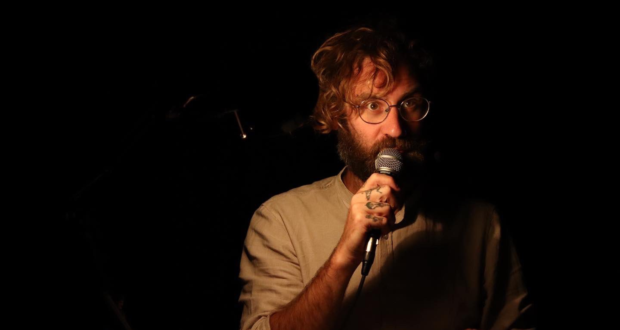Assembly George Square Studios – Studio Five
An enthralling, stripped-back yet intricate auditory performance. Summary
Rating
Excellent
Max Barton pitches us the concept for a film that he came up with on a lockdown-fuelled wander. The piece follows the protagonist as they try to navigate the climate crisis, and suggests how we humans are to blame. They explore how mushrooms are a wonderful example of communicating cells, but like our immune systems, they fight against that which is harming them. Within the heavier subject matter, Concept for a Film finds the space to satirise the West’s military (a voiceover that would fit right in on a Hollywood war film), suggesting that pinning every issue on foreign enemies is just not necessary.
Borrowing from the language of cinema we have a ‘close up’ of the protagonist as they find a mushroom near their research centre. But the action stops as Barton asks themself who this film centres around. Is it okay to write this protagonist based on himself – a Jewish, gender-questioning human living in the west of the northern hemisphere – when climate change disproportionately affects people of colour within the southern hemisphere? And is it ethical to start writing as someone else without the input of a co-writer? Barton’s answer is to give us the opportunity to be the protagonist, to bring our lived experiences to the forefront of this performance. We seamlessly weave between screenplay directions, plenty of cringey yet clever puns, with the writer’s commentary pointing out how the stakes are raised at the beginning of act two, as all great gurus would suggest. Barton’s performance is captivating throughout.
The audience is invited to find a consistent note to hum, which was initially a struggle on our part. Jethro Cooke (making up one body of the Second Body theatre company duo) records this and builds his underscore with our collective sound. His instruments are otherworldly, fungi-like podiums of wires that produce noise in reaction to a range of stimuli; light, touch, immersion in water. Orchestral harmonies rise, whilst sharp staccato sounds play off the pacier moments. This is a joy to listen to.
Down in the depths of Studio 5 at the Assembly George Square, we sit in the rows of a small lecture theatre. The intimate staging is split, with Barton on one side in table-lamp-lit existential crisis, and Cooke’s amassing jungle of technological roots on the other. I was taken back to my university days: learning about dramatic structure, how to pitch a story and finding your writing voice. Barton’s meta rants include a discussion of phase space, a paralysing writer’s block induced by the infinite possibility of actions for characters to enact, and the infinite possibility of manners in which to describe these actions. Ironically, all that thinking leaves the writer inactive, something I empathised with. Or was I just lazy? Clearly Concept for a Film has inspired some healthy reflection in me.
As Barton zooms out from the minutiae of the little lifetimes we have in this world, we listen to a heartfelt song his dad wrote that for me is about the essence of existence. I left with a great sense that we should spend less time here concentrating on doing, and more time feeling. I felt lots during Concept for a Film.
Written by Max Barton and Jethro Cooke
Concept For A Film plays at EdFrige until 27 August. Further information and bookings here.
 Everything Theatre Reviews, interviews and news for theatre lovers, London and beyond
Everything Theatre Reviews, interviews and news for theatre lovers, London and beyond




I can’t say this play, or written performance was good in much, or any way at all.
Where I live (Wellington, New Zealand) postering had appeared giving – apparently – a dozen five star reviews to the talent and entertainment value of Max Barton, a theatre-maker of some kind. However, if you look closer, the entities handing out these must-see reviews aren’t necessarily one’s you’ve heard of.
Barton and his Oxbridge “conceptual theatre” buddies are . . . actually really bad.
Put it this way, would a quality writer or director cast Max Barton as the lead in this play? I wouldn’t guess so; he’s professionally articulate but none of his personal concerns and little of what he puts across is moving or witty.
The real problem with Concept for a Film, in short, is that the actor/reader goes all in to convince the audience that he’s a Very Clever Person that’s Very Aware of the technique and structure of narrative (at times, upping the pretense factor by alluding to scientific research, or claiming tenuous similarities between imaginary storytelling and maths probabilities) . . . anyway, at the heart of this performance, there really isn’t an effective story.
If you went to this play and felt the gig was a guy telling you how clever and “meta” he was about story structure, then you get to the last ten minutes and no story has occurred, then you are probably in the majority of questioning, unsatisfied audience members sold on this emotionally unaffecting piece. Also features “live sound design”, 80% of which is just droning noise that any DAW or home computer can make with affordable software.
The real problem with Concept for a Film is that it dwells on tragic themes: environmental abuses and family loss, but there’s almost no emotion anywhere and, really, the entire show’s about Max Barton, a writer who wants your attention for 70 minutes but doesn’t include anything resembling an excellent story, just themes and choppy, disjunctive techniques, asides, diversions and endless chatter. Contemporary arts types that mistake bad work for innovation – I liked the performer at the start and wanted to sleep or leave about 2/3rds in.